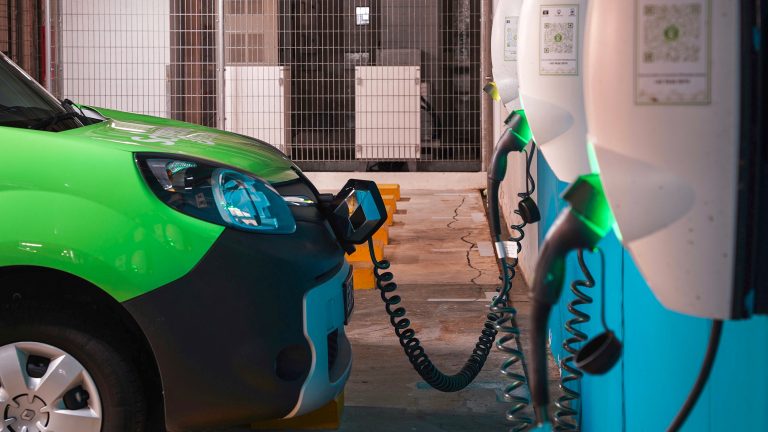In the first week of August, riders working for the Dunzo delivery app in Bengaluru were informed that they would be a part of billionaire Mukesh Ambani’s Reliance megaverse. From then on, some riders working for Dunzo — into which Reliance Retail had invested $240 million earlier in the year — would fulfill orders for JioMart, the e-commerce portal owned by Ambani.
This last-mile integration with Dunzo’s delivery service took eight months to execute, and is a crucial step in Ambani’s ambition to control a larger share of India’s e-commerce market, industry analysts told Rest of World. Morgan Stanley estimates the Indian e-commerce industry to reach $200 billion by 2026.
Ambani launched JioMart in the spring of 2020 as a grocery-ordering app, serving Indians stuck at home during the lockdown. Since then, JioMart has slowly scaled into a full-fledged e-commerce portal, selling everything from home appliances and fashion to electronics and beauty products. Unlike competitors Flipkart and Amazon, which are supposed to operate as marketplaces for third-party vendors, only a limited number of the sellers on JioMart are independent third parties, according to retail industry analysts. The majority of listings on JioMart are from Reliance’s own brands, and deliveries are dispatched from the 15,000 Reliance Retail stores across India.
JioMart has had recent success with its offline-online hybrid e-commerce model. For the first time, the company hosted a Diwali sale, starting September 23, on its platform — sales during the week spiked by 2.5 times. Though JioMart’s market share remained miniscule — with established platforms Flipkart and Amazon accounting for 88% of the $5.7 billion sales in the first week of September — the upstart did manage to cement its position.
“From an acceptability and usage standpoint, Indian customers have welcomed JioMart,” Sanjay Kothari, an e-commerce analyst at market research firm RedSeer, told Rest of World. “This year, they focused on establishing JioMart as a horizontal platform, and getting that message out clearly to their users. When the next festive [sales] comes, they will be well-placed to become one of the larger players in the sector.”
For Ambani, India’s largest operator of physical retail stores, entering the e-commerce turf was a foregone conclusion. But the company is carving out a niche for unique product categories. “They avoided the smartphone category to avoid competing with Flipkart and Amazon, who hold a duopoly with 90% market share,” Satish Meena, an independent e-commerce analyst, told Rest of World. Instead, Reliance decided to stick to its strengths: groceries. “On average, 30% of modern grocery is sold through Reliance,” Meena said. “That’s why JioMart merits a good case for them.”
Within two years of its launch, JioMart has outdone its peers in the grocery category. Today, JioMart fulfills 600,000 deliveries per day across 260 cities and towns in India. The fulfillment happens through Reliance’s own retail stores and neighborhood mom-and-pop outlets, called kiranas, which accounted for 88% of consumer purchases in India in 2020. Reliance has been renting out point-of-sale (POS) machines to kirana stores as a way of digitizing them, and getting them to use its own payments service. Research firm Bernstein acknowledged JioMart’s success in an August 30 note: While Amazon struggled to maintain its dominance, Reliance has scaled up its e-commerce operations to become the leader in the online grocery category, the note said.
Still, Reliance is finding it hard to shake off the legacy habit of being an offline-first company. Online, there have been numerous complaints about JioMart’s app, payment failures, and incomplete deliveries, which hints at the bigger problem of streamlining inventory across its online and offline properties.
JioMart and Dunzo did not respond to queries from Rest of World.

Stocking up on its own inventory is a distinct regulatory advantage for Reliance. India does not allow foreign retailers, including Amazon and the Walmart-owned Flipkart, to stock their own inventory, and forces them to operate as pure marketplaces. Foreign retailers have found workarounds by owning stakes in multiple large seller entities, which has led to investigations from India’s competition commission in the past. Not being bound by those regulations is one of Reliance’s biggest advantages as it scales, Bernstein wrote in its note.
JioMart’s biggest win yet has been its integration with WhatsApp, which allows the instant messaging app’s existing customer base of 400 million to easily access JioMart by simply sending a message. JioMart can also initiate messages, nudging users to shop. “You will see a new business model built on WhatsApp that will have a very low CAC [customer acquisition cost] or marketing expense,” Rahul Malhotra, a senior analyst at Bernstein covering Indian technology, media, and internet, told Rest of World. “Effectively, I’m actually offering my existing customer base incremental services.” The integration with WhatsApp has grown at a fast clip but is yet to drive large order volumes that JioMart would expect. In September, JioMart received 21,000 orders via WhatsApp, a company employee aware of the numbers told Rest of World, requesting anonymity as they are not authorized to talk to the media.
Retail analysts Rest of World spoke to believe that in the coming months, JioMart will focus its energies on burnishing its last-mile delivery, which hasn’t been its strong suit. This is where the back-end integration with Dunzo assumes greater significance. Independent analyst Meena expects Dunzo’s delivery fleet to be used for premium fashion and electronics in the coming months. Reliance has long-term license agreements with fast fashion brands such as Superdry, and could use Dunzo’s fleet to fulfill online orders. “Dunzo will be the last-mile delivery partner not only for JioMart, but for other retail brands that Reliance owns,” Meena said.



